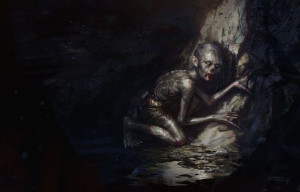A guest post by Joshua David Bennett.
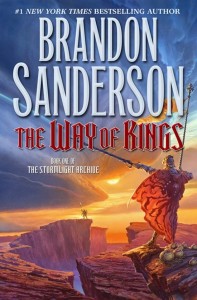 Kaladin Stormblessed, hero of Brandon Sanderson’s thousand page monster Way of Kings, is one of my most deeply satisfying character reads in recent years – because of his response to pain.
Kaladin Stormblessed, hero of Brandon Sanderson’s thousand page monster Way of Kings, is one of my most deeply satisfying character reads in recent years – because of his response to pain.
We first meet Kaladin in chains – enslaved and bound via wooden cart for the far reaches of the world. Sanderson piles the suffering on in subsequent pages, littering Kaladin’s past and present with indignity upon indignity. His family is cheated by the same community they work so hard to heal. His thirteen year old brother Tien is killed in a senseless battle before Kaladin’s own eyes. His comrades and friends are slaughtered. He is betrayed, falsely accused, branded and enslaved. He is forced to serve as a meatshield, cheap and expendable fodder in a protracted war that exists solely to line the pockets of the rich.
Catalyst of growth
Part of what makes Kaladin so engaging is that each wound serves to further draw out his strengths as a leader. When Tien is unfairly conscripted, Kaladin goes to war to keep his brother safe. When Kaladin is enslaved, he includes others in his escape attempts, even though doing so dooms him to recapture. When he is forced, unarmored and unarmed, to carry a bridge toward a line of enemy archers, Kaladin draws their fire to himself to save others. When the other bridgemen curse him, he binds their wounds.
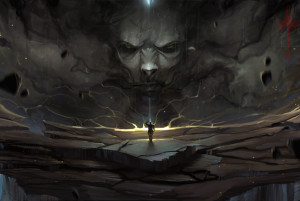
Stormblessed - Kaladin and the Stormfather. Image by Kelley Karris. Used with permission.
It is this pattern of acting with honor that draws a spirit named Syl, who awakens within Kaladin his own power to control the very forces of nature. At his lowest point, Kaladin is stripped and exposed to the oncoming wall of a highstorm – magical tempests that make Earth’s hurricanes look tame. In the storm, Kaladin has an encounter with the divine and is called to refound an ancient order of knights who protected mankind.
Origin of fatal flaws
And yet, the same wounds that spur his growth also cause his greatest failings. Betrayal at the hands of the highborn “Lighteyed” caste causes Kaladin hatred of nobility. He is rash, impulsive, and plagued by his own poor decision making. Like Edmond Dantès, Kaladin thinks he is pursuing justice, but what he really wants is punishment – to hurt those who have hurt him. And like Dantès, his quest for revenge jeopardizes every positive relationship in his life and threatens to nullify all of his sacrificial acts.
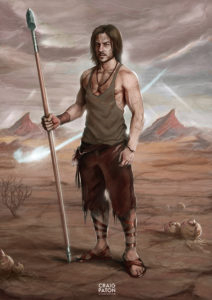
Kaladin by Craig Paton. Used with permission.
After building an unlikely friendship with a general who is noble not only in title but also in action, Kaladin throws away everything he has built, choosing a monumentally poor moment to challenge the man who betrayed him. His actions land him in prison and endanger his friends as well as his new powers. Syl, the spirit who was attracted to Kaladin when he acted with honor, is repelled when Kaladin acts with hatred.
Life IS pain, anyone who says different is selling bland fiction
Suffering and loss are fantastic tools to kick off a character’s arc. Trauma is the inciting incident in many stories, sustaining Edmond Dantès in prison with thoughts of revenge, launching young Bruce Wayne’s unconventional career in crime fighting, and prompting Luke Skywalker to follow a crazy hermit off planet.
However, pain should not only impact a character’s origin. Consider Batman. The murder of Bruce Wayne’s parents is not only a critical starting point, it is also an ongoing source of inspiration and struggle. Despite his great physical strength and massive fortune, Batman still struggles with the passions of fear and anger that were created that night in a Gotham alley. Contrast Luke Skywalker. Uncle Owen and Aunt Beru’s smoking corpses are seemingly forgotten the moment Luke hops behind the controls of an X-Wing for the first time.
This is not to say that our characters ought to mope. Characters are sympathetic when they overcome pain, not when they wallow in it. As Orson Scott Card says, “if your characters have good reason to cry and don’t, your readers will do the weeping.” And even better if the characters emerge with both wisdom and scars, overcoming in both healthy and unhealthy ways.
Avoiding a world of orphans
I’ve been a gamemaster for Star Wars and Pathfinder role playing games for years, and I have yet to see one happy origin story. The Galactic Empire has seemingly carried out a systematic campaign to orphan every youngling before the age of ten, sometimes even murdering the family nerf just to rub salt in the wound. In a game, this is rarely a problem beyond the first session – once the shooting begins, the power is in the group’s shared experience rather than the story on the character sheet.
In our fiction however, even having two or three main characters with traumatic childhoods might come across as farce. Fortunately, pain comes in many forms and it need not all be at the hands of villains. Characters can be victims of circumstance, nature, or their own past failures, as is the case with Tony Stark or Jack Bauer.
If you do choose to incorporate suffering into a character’s backstory, how do you avoid infodump or yanking your reader out with overblown flashbacks? Thankfully, Fictorians has covered the topic, as have multiple episodes of the Writing Excuses podcast.
Now get out there. Ruthlessly put your characters through maximum pain and (mostly) bring them out the other side, stronger and more interesting for the experience.

Author Joshua David Bennett is a scotch lover, history enthusiast, graphic artist, and world traveler. His first novel, Seacaster, is a Caribbean-Aztec fantasy that tells the story of a young man at war with the magic coursing through his veins. Joshua lives in Colorado with his wife and son.
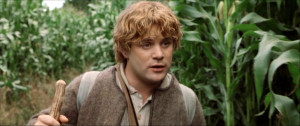 With all the great heroes and villains in the world to choose from, why would I focus on Samwise Gamgee?
With all the great heroes and villains in the world to choose from, why would I focus on Samwise Gamgee? He starts the story as a side-kick, and seems content with his role. He’s an often comic character. He’s not very smart, and he knows it. He accepts that his place in the world is not to be the hero, but to be the hero’s cook, assistant, and bodyguard. And yet, he demonstrates in his simple way that heroes are not always the great warriors, with the flashy armor or dazzling magic. Heroes get the job done.
He starts the story as a side-kick, and seems content with his role. He’s an often comic character. He’s not very smart, and he knows it. He accepts that his place in the world is not to be the hero, but to be the hero’s cook, assistant, and bodyguard. And yet, he demonstrates in his simple way that heroes are not always the great warriors, with the flashy armor or dazzling magic. Heroes get the job done.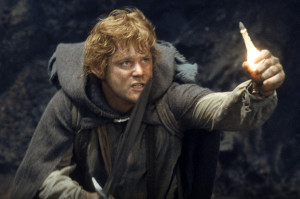 He is a gardener who love the simple joy of green, growing things.
He is a gardener who love the simple joy of green, growing things.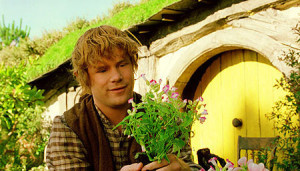 When Frodo says, “I’m going to Mordor alone, Sam,”
When Frodo says, “I’m going to Mordor alone, Sam,”
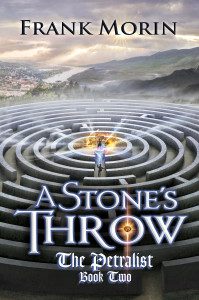 Frank Morin loves good stories in every form. When not writing or trying to keep up with his active family, he’s often found hiking, camping, Scuba diving, or enjoying other outdoor activities. For updates on upcoming releases of his popular Petralist YA fantasy novels, or his fast-paced Facetakers scifi time travel thrillers, check his website: www.frankmorin.org
Frank Morin loves good stories in every form. When not writing or trying to keep up with his active family, he’s often found hiking, camping, Scuba diving, or enjoying other outdoor activities. For updates on upcoming releases of his popular Petralist YA fantasy novels, or his fast-paced Facetakers scifi time travel thrillers, check his website: www.frankmorin.org




